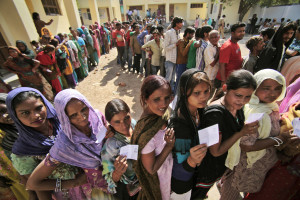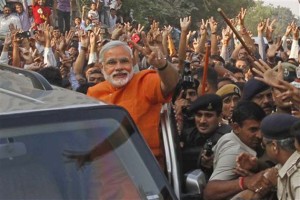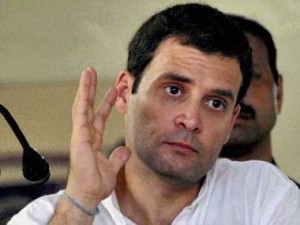America often boasts of being the oldest democracy, but India is the largest and most participatory.
 India demonstrated this in awe-inspiring fashion over the past five weeks as 550 million voters, representing 66.4 percent of the electorate, participated in a general election. By comparison, only 121 million voters participated in the 2012 U.S. general election, representing just 57.5 percent.
India demonstrated this in awe-inspiring fashion over the past five weeks as 550 million voters, representing 66.4 percent of the electorate, participated in a general election. By comparison, only 121 million voters participated in the 2012 U.S. general election, representing just 57.5 percent.
No less impressive, though, is that India conducted this massive democratic exercise with none of the administrative incompetence, vote rigging and/or partisan violence that attend elections in so many developing countries.
That said, the major issues in this election were the same as they are in elections in most democracies these days: economic growth and better governance.
In this case, the opposition Hindu nationalist Bharatiya Janata Party (BJP) campaigned on the aspirational principles of self-empowerment and entrepreneurship, appealing to India’s 100 million newly registered voters – most of whom are young and urban. The ruling alliance, led by the National Congress Party (NCP), campaigned on its settled principles of social welfare and party loyalty, appealing to India’s older, rural and poorer voters.
This of course is hardly the forum to delve into the issues or the results. Therefore, suffice to know that the BJP won a landslide victory, winning an outright majority (as of this writing) of 284 seats in India’s 543-seat parliament. The NCP suffered its worst defeat in history, winning only 44.
 This means that the BJP’s charismatic leader, Narendra Modi (63), will become the next prime minister. Alas, a dark cloud is raining down criticisms on his electoral parade about his brand of Hindu nationalism. They stem from his failure in 2002, when he was leader of the regional state of Gujurat, to stop religious riots which saw Hindus slaughter more than 1000 Muslims with relative impunity.
This means that the BJP’s charismatic leader, Narendra Modi (63), will become the next prime minister. Alas, a dark cloud is raining down criticisms on his electoral parade about his brand of Hindu nationalism. They stem from his failure in 2002, when he was leader of the regional state of Gujurat, to stop religious riots which saw Hindus slaughter more than 1000 Muslims with relative impunity.
Yes, you can be forgiven for thinking that the 1947 Partition of India precluded even the possibility of such sectarian violence. But Indians need only look across the Bay of Bengal to see the violence that besets Myanmar (where national leaders seem politically disposed to stand by as majority Buddhists slaughter minority Muslims) to appreciate what portends if Modi and the BJP are as tolerant as national leaders of Hindus slaughtering Muslims as they were as regional leaders.
In any event, such was the universal nature of the blame ascribed to Modi for that 2002 massacre that the Bush administration banned him from traveling to the United States.
But that was then – as President Obama telegraphed yesterday afternoon when he joined other heads of state in calling Modi to offer congratulations and, no doubt, extend invitations for state visits to forge mutually beneficial friendships.
 On the other hand, this means that the NCP’s dynastic leader, Rahul Gandhi (43), has suffered a defeat as humiliating as it is historic. After all, this result is as much a rejection of the Gandhi-Nehru family who have dominated Indian politics since the 1920s as it is a rejection of the NCP that has ruled India virtually every year since Independence. (A BJP-led alliance ruled from 1998 to 2004.)
On the other hand, this means that the NCP’s dynastic leader, Rahul Gandhi (43), has suffered a defeat as humiliating as it is historic. After all, this result is as much a rejection of the Gandhi-Nehru family who have dominated Indian politics since the 1920s as it is a rejection of the NCP that has ruled India virtually every year since Independence. (A BJP-led alliance ruled from 1998 to 2004.)
Indeed, Modi knew well what he was doing when he peppered his stump speeches with derisive references to Rahul as the “feudal prince” who felt himself entitled to be king. For it is clear to see how this would have resonated not only with young voters – who know more about Rihanna and Justin Bieber than they do about Indira and Rajiv Gandhi (let alone Mohandas Gandhi and Jawaharlal Nehru), but also with poor voters – who are as frustrated with the stagnant economic growth as they are disillusioned with the rampant political corruption that have dogged NCP rule for much of the past decade.
Hell, such was the shocking disregard for the Gandhi family that Rahul barely won re-election in his home constituency.
Apropos of which, and with all due respect to Modi, it is the end of the Gandhi-Nehru dynasty, not his election as prime minister, that is the most significant outcome of this Indian general election. Here’s the more authoritative way historian Ramachandra Guha summed this up:
The larger sociological shift is that Indian society is becoming more democratic and less feudal, less deferential to family privilege. It’s possible that Rahul Gandhi and Priyanka Gandhi [his younger and more charismatic sister] cannot revive Congress, because India has moved on.
(New York Times, May 16, 2014)
I wish Modi and his BJP all the best. Especially considering the vested interest all Western democracies have in seeing democratic India surpass totalitarian China in all indicators of national success. Moreover, even though they clearly enjoy more personal freedoms than the Chinese, Indians must surely hope the BJP can create the kind of personal (and national) wealth for them that the Communist Party has created for the Chinese.
Finally, Modi seems set for a period of honeymoon euphoria that makes that which Obama enjoyed look tepid (notwithstanding the rock star reception he received in places like Cairo and Berlin). But this only means that the realities of governing India could result in disillusionment far worse than that which Obama had to contend with once the realities of governing America set in. It behooves Modi to bear these inevitable realities in mind.